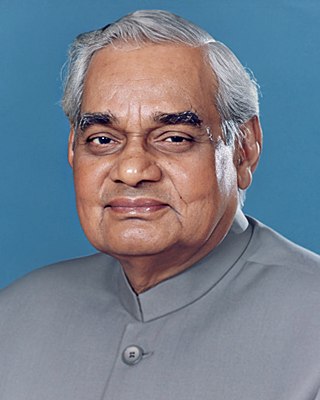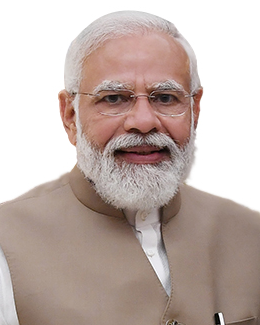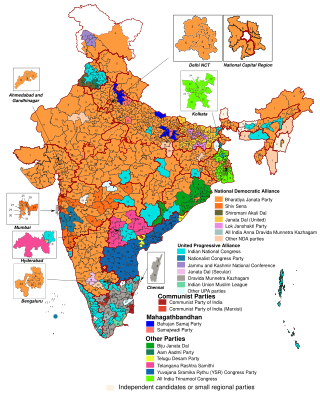
The prime minister of India is the head of government of the Republic of India. Executive authority is vested in the prime minister and his chosen Council of Ministers, despite the president of India being the nominal head of the executive. The prime minister is often the leader of the party or the coalition with a majority in the lower house of the Parliament of India, the Lok Sabha, which is the main legislative body in the Republic of India. The prime minister and their cabinet are at all times responsible to the Lok Sabha.

Atal Bihari Vajpayee was an Indian politician and poet who served three terms as the 10th Prime Minister of India, first for a term of 13 days in 1996, then for a period of 13 months from 1998 to 1999, followed by a full term from 1999 to 2004. Vajpayee was one of the co-founders and a senior leader of the BJP. He was a member of the RSS, a Hindu nationalist volunteer organisation. He was the first Indian prime minister not of the INC to serve a full term in office. He was also a renowned poet and a writer.

The Bharatiya Janata Party is a political party in India and one of the two major Indian political parties alongside the Indian National Congress. Since 2014, it has been the ruling political party in India under the incumbent Prime Minister Narendra Modi. The BJP is aligned with right-wing politics, and its policies adhere to Hindutva, a Hindu nationalist ideology. It has close ideological and organisational links to the Rashtriya Swayamsevak Sangh (RSS) volunteer paramilitary organisation. As of September 2023, it is the country's biggest political party in terms of representation in the Parliament of India as well as state legislatures.

The National Democratic Alliance (NDA) is a centre-right to right-wing conservative Indian political alliance led by the right-wing Bharatiya Janata Party (BJP). It was founded in 1998 and currently controls the government of India as well as the government of 15 Indian states and one Union territory.

Narendra Damodardas Modi is an Indian politician who has served as the 14th prime minister of India since May 2014. Modi was the Chief Minister of Gujarat from 2001 to 2014 and is the Member of Parliament (MP) for Varanasi. He is a member of the Bharatiya Janata Party (BJP) and of the Rashtriya Swayamsevak Sangh (RSS), a right wing Hindu nationalist paramilitary volunteer organisation. He is the longest-serving prime minister from outside the Indian National Congress.

Yashwant Sinha is an Indian administrator and politician. He served as the Minister of Finance from 1990 until 1991 under Prime Minister Chandra Shekhar and again from March 1998 to July 2002 under Prime Minister Atal Bihari Vajpayee. He also served as the Minister of External Affairs from July 2002 until May 2004. He was a senior leader of the BJP before he left the party on 21 April 2018.

General elections were held in India in four phases between 20 April and 10 May 2004. Over 670 million people were eligible to vote, electing 543 members of the 14th Lok Sabha. Seven states also held assembly elections to elect state governments. They were the first elections fully carried out with electronic voting machines.

Manmohan Singh is an Indian politician, economist, academician and bureaucrat who served as the 13th Prime Minister of India from 2004 to 2014. He is the third longest-serving prime minister after Jawaharlal Nehru and Indira Gandhi. A member of the Indian National Congress, Singh was the first Sikh and non-Hindu prime minister of India. He was also the first prime minister since Jawaharlal Nehru to be re-elected after completing a full five-year term.

The Union Budget of India, also referred to as the Annual Financial Statement in Article 112 of the Constitution of India, is the annual budget of the Republic of India set by Ministry of Finance for the following financial year, with the revenues to be gathered by Department of Revenue to identify planned government spending and expected government revenue and the expenditures gathered by Department of Expenditure of the public sector, to forecast economic conditions in compliance with government policy.

Ravi Shankar Prasad is an Indian politician and lawyer, from the Bharatiya Janata Party. A Member of Parliament since 2000, first in the Rajya Sabha (2000-2019) and then in the Lok Sabha, Prasad has served as Union Minister multiple times: As Minister of State, he served in the ministries of Coal (2001-2003), Law and Justice (2002-2003), and Information and Broadcasting (2003-2004) under Atal Bihari Vajpayee's premiership; as Cabinet Minister, he held the Law and Justice, Communications, and Electronics and Information Technology (2014-2021) portfolios under Narendra Modi's premiership.

General elections were held in India in nine phases from 7 April to 12 May 2014 to elect the members of the 16th Lok Sabha. With 834 million registered voters, they were the largest-ever elections in the world until being surpassed by the 2019 elections. Around 23.1 million or 2.7% of the total eligible voters were aged 18–19 years. A total of 8,251 candidates contested the 543 elected Lok Sabha seats. The average election turnout over all nine phases was around 66.40%, the highest ever in the history of Indian general elections.

Atal Bihari Vajpayee was an Indian politician who served twice as Prime Minister of India, first from 16 May to 1 June 1996, and then from 19 March 1998 to 22 May 2004. A member of the Bharatiya Janata Party (BJP), Vajpayee was the tenth Prime Minister. He headed the BJP-led National Democratic Alliance in the Indian Parliament, and became the first Prime Minister unaffiliated with the Indian National Congress to complete a full five-year term in office. He died at the age of 93 on Thursday 16 August 2018 at 17:05 at AIIMS, New Delhi.

The Bharatiya Janata Party (BJP) is one of the major political parties in India and is the main opposition party during the 15th Lok Sabha. It contested the 2014 parliamentary election along with their supportive parties, to form National Democratic Alliance with Narendra Modi as its Prime Ministerial candidate and party president Rajnath Singh as the chief-of-election of campaign. The important issues during the campaign included price hikes, corruption, the economy, national security, basic infrastructure such as roads and railways, and supplying basic needs such as electricity and water. The party promised a vibrant and participatory democracy, inclusive and sustainable development, quality of life, productive youth, a globally competitive economy, open and transparent government, and pro-active and pro-people governance in its manifesto.

General elections were held in India in seven phases from 11 April to 19 May 2019 to elect the members of the 17th Lok Sabha. Votes were counted and the result was declared on 23 May. The election resulted in a landslide victory for the BJP which won 303 seats and formed the government.

The Next Indian general election is expected to be held in India between April and May 2024 to elect the members of the 18th Lok Sabha.

The Rafale deal controversy is a political controversy in India related to the purchase of 36 Rafale multirole fighter aircraft for a price estimated at €7.87 billion by the Defence Ministry of India from France's Dassault Aviation. The origin of the deal lies in the Indian MMRCA competition, a multi-billion dollar contract to supply 126 multi-role combat aircraft to the Indian Air Force (IAF) with a transfer of technology.

Aditya Sinha is an Indian author and journalist. His last assignment was as the Editor-in-Chief of the Deccan Chronicle, based in Hyderabad, which also publishes the Asian Age in Delhi. He has been a journalist since 1987, occupying positions such as Editor-in-Chief of The New Indian Express and DNA. He has reported on terrorism in Punjab, Kashmir and Assam and has also done reporting from Peshawar, Pakistan. He started out as a crime reporter in Delhi.

The Bihar Legislative Assembly election was held in three phases through October–November to elect members to the Seventeenth Bihar Legislative Assembly. The term of the previous Sixteenth Legislative Assembly of Bihar ended on 29 November 2020.
Tukde Tukde Gang is a pejorative political catchphrase used in India by the Bharatiya Janata Party (BJP) and accusing their critics for allegedly supporting sedition and secessionism. Whereas the words tukde-tukde refer to "breaking or cutting something into small fragments", the phrase "tukde tukde gang" can be translated as "a gang that wants to divide the country". The phrase is used by BJP leadership, and some news channels to stigmatize political opponents who have different political views.
















